Cultural Diversity and LGBTI Experiences
VerifiedAdded on 2023/01/20
|14
|3689
|65
AI Summary
This article explores the experiences of an LGBTI individual and the impact of cultural diversity on their life. It discusses discrimination, stereotypes, and the importance of social support. The interviewee shares personal stories of bullying, workplace discrimination, and cultural biases.
Contribute Materials
Your contribution can guide someone’s learning journey. Share your
documents today.
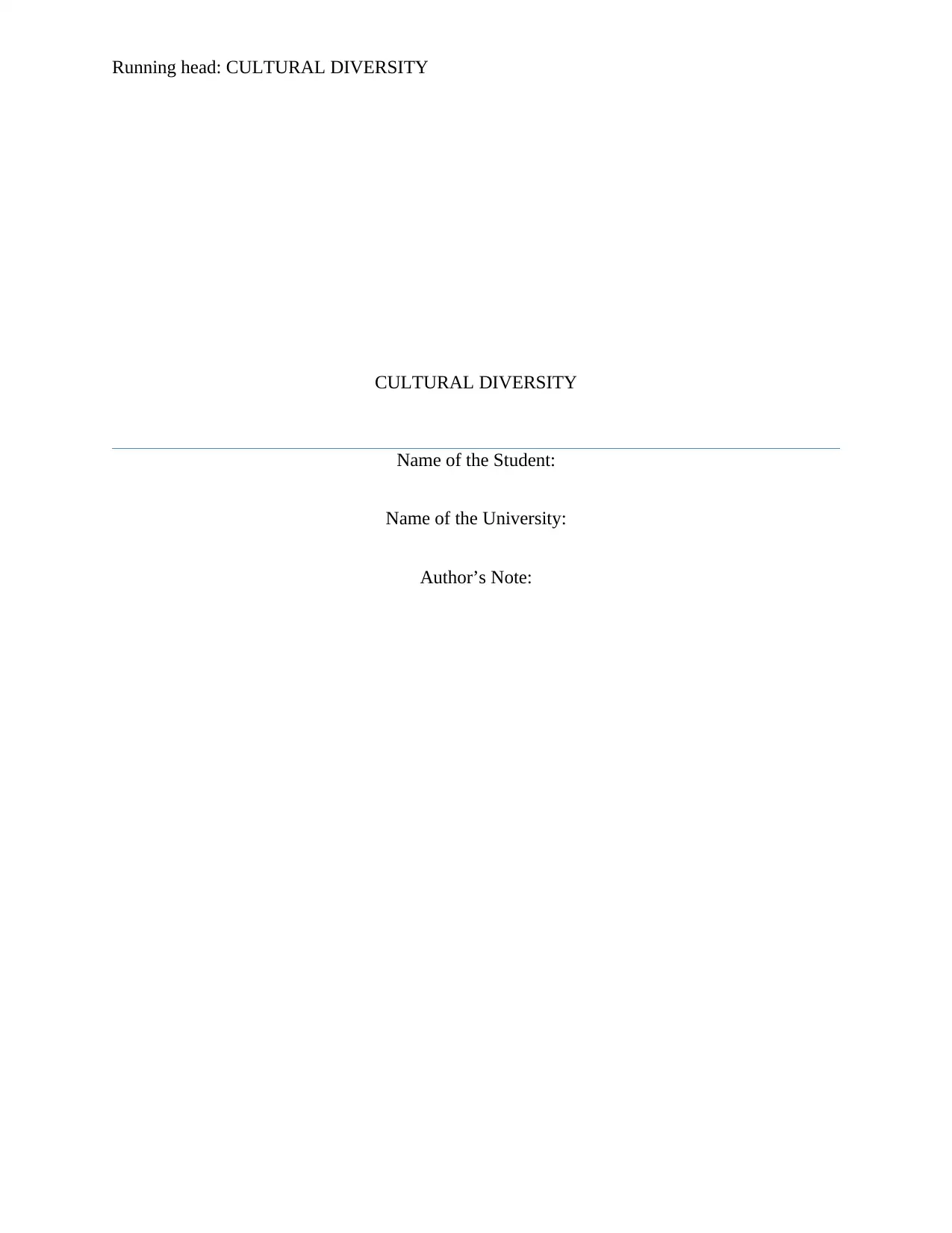
Running head: CULTURAL DIVERSITY
CULTURAL DIVERSITY
Name of the Student:
Name of the University:
Author’s Note:
CULTURAL DIVERSITY
Name of the Student:
Name of the University:
Author’s Note:
Secure Best Marks with AI Grader
Need help grading? Try our AI Grader for instant feedback on your assignments.
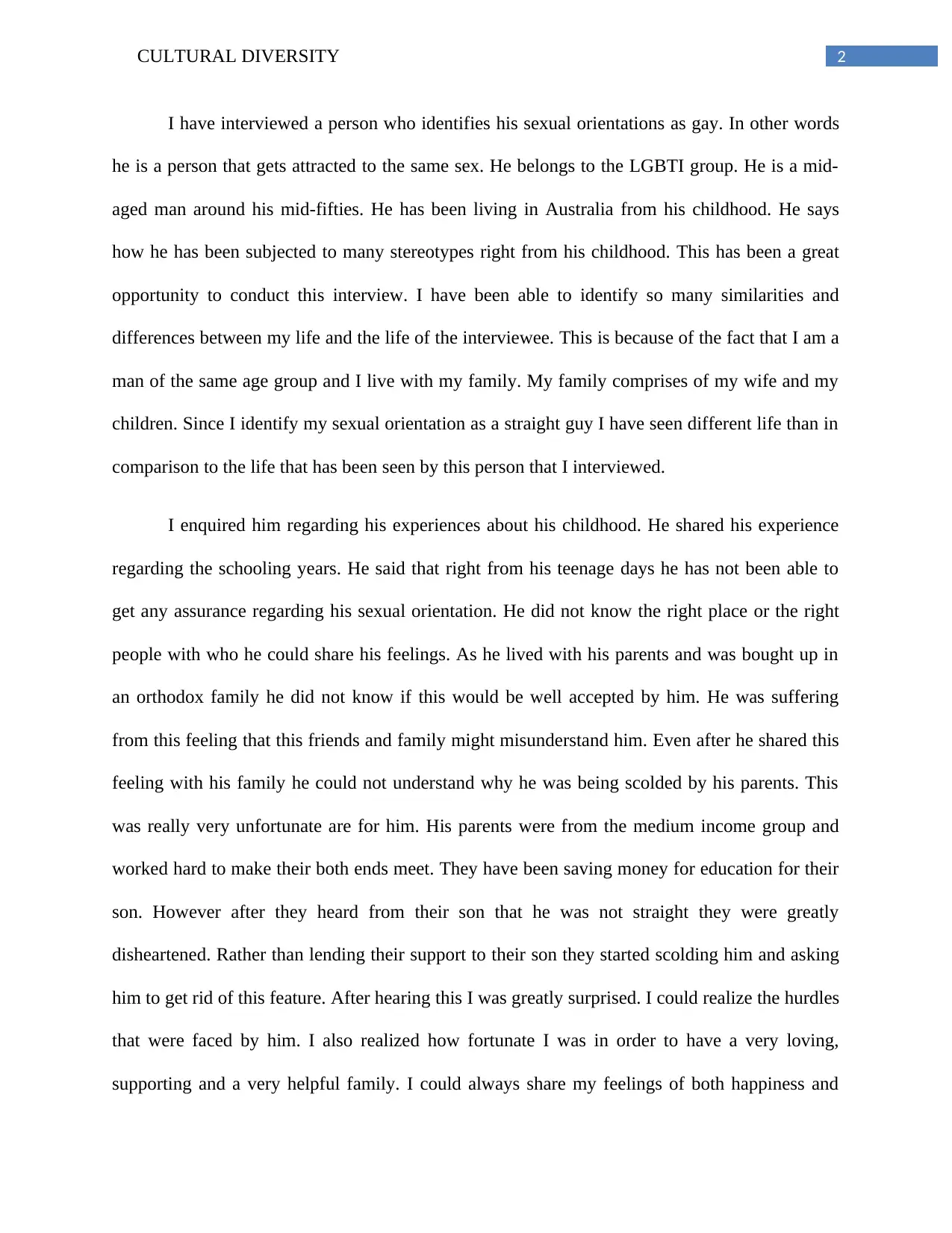
2CULTURAL DIVERSITY
I have interviewed a person who identifies his sexual orientations as gay. In other words
he is a person that gets attracted to the same sex. He belongs to the LGBTI group. He is a mid-
aged man around his mid-fifties. He has been living in Australia from his childhood. He says
how he has been subjected to many stereotypes right from his childhood. This has been a great
opportunity to conduct this interview. I have been able to identify so many similarities and
differences between my life and the life of the interviewee. This is because of the fact that I am a
man of the same age group and I live with my family. My family comprises of my wife and my
children. Since I identify my sexual orientation as a straight guy I have seen different life than in
comparison to the life that has been seen by this person that I interviewed.
I enquired him regarding his experiences about his childhood. He shared his experience
regarding the schooling years. He said that right from his teenage days he has not been able to
get any assurance regarding his sexual orientation. He did not know the right place or the right
people with who he could share his feelings. As he lived with his parents and was bought up in
an orthodox family he did not know if this would be well accepted by him. He was suffering
from this feeling that this friends and family might misunderstand him. Even after he shared this
feeling with his family he could not understand why he was being scolded by his parents. This
was really very unfortunate are for him. His parents were from the medium income group and
worked hard to make their both ends meet. They have been saving money for education for their
son. However after they heard from their son that he was not straight they were greatly
disheartened. Rather than lending their support to their son they started scolding him and asking
him to get rid of this feature. After hearing this I was greatly surprised. I could realize the hurdles
that were faced by him. I also realized how fortunate I was in order to have a very loving,
supporting and a very helpful family. I could always share my feelings of both happiness and
I have interviewed a person who identifies his sexual orientations as gay. In other words
he is a person that gets attracted to the same sex. He belongs to the LGBTI group. He is a mid-
aged man around his mid-fifties. He has been living in Australia from his childhood. He says
how he has been subjected to many stereotypes right from his childhood. This has been a great
opportunity to conduct this interview. I have been able to identify so many similarities and
differences between my life and the life of the interviewee. This is because of the fact that I am a
man of the same age group and I live with my family. My family comprises of my wife and my
children. Since I identify my sexual orientation as a straight guy I have seen different life than in
comparison to the life that has been seen by this person that I interviewed.
I enquired him regarding his experiences about his childhood. He shared his experience
regarding the schooling years. He said that right from his teenage days he has not been able to
get any assurance regarding his sexual orientation. He did not know the right place or the right
people with who he could share his feelings. As he lived with his parents and was bought up in
an orthodox family he did not know if this would be well accepted by him. He was suffering
from this feeling that this friends and family might misunderstand him. Even after he shared this
feeling with his family he could not understand why he was being scolded by his parents. This
was really very unfortunate are for him. His parents were from the medium income group and
worked hard to make their both ends meet. They have been saving money for education for their
son. However after they heard from their son that he was not straight they were greatly
disheartened. Rather than lending their support to their son they started scolding him and asking
him to get rid of this feature. After hearing this I was greatly surprised. I could realize the hurdles
that were faced by him. I also realized how fortunate I was in order to have a very loving,
supporting and a very helpful family. I could always share my feelings of both happiness and
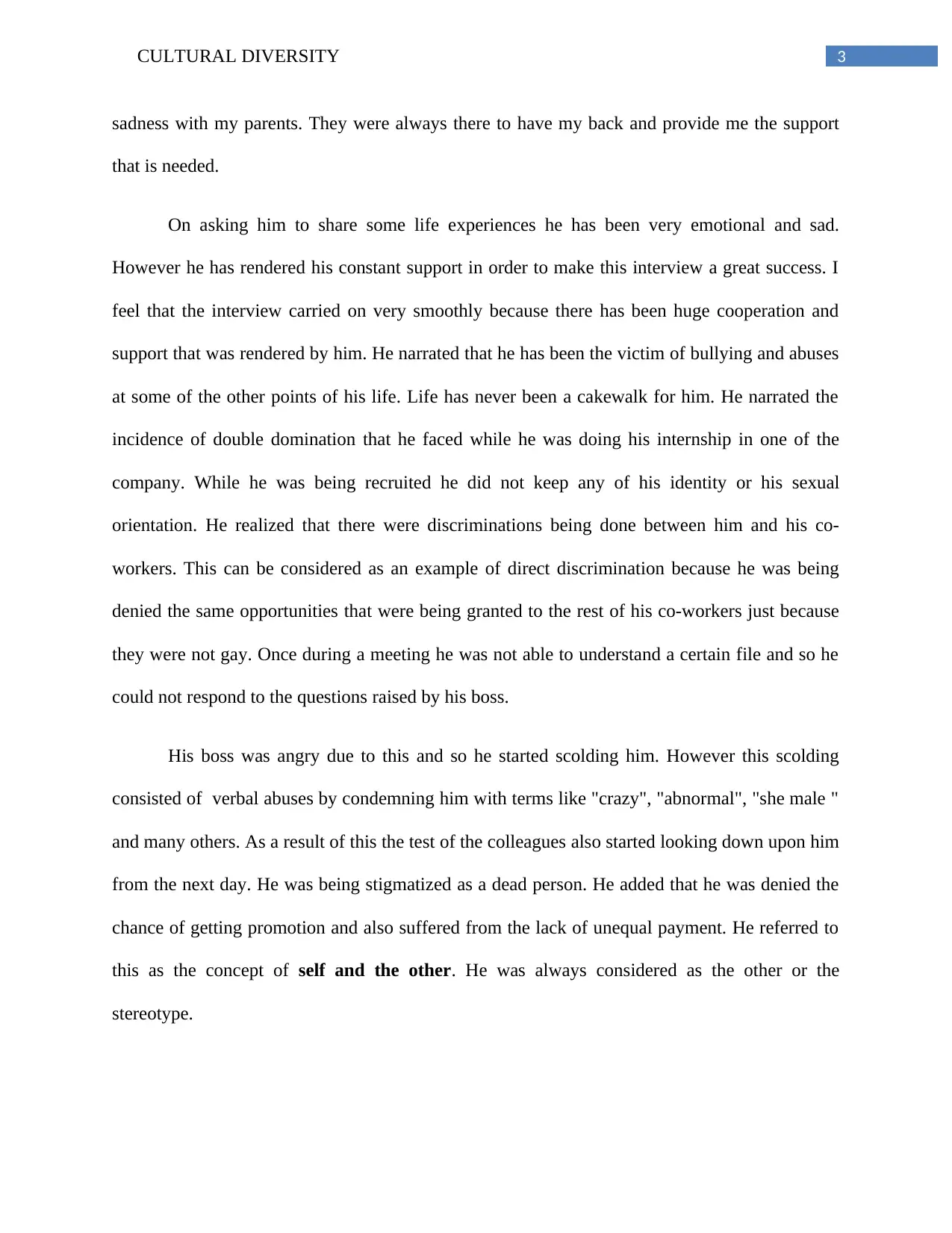
3CULTURAL DIVERSITY
sadness with my parents. They were always there to have my back and provide me the support
that is needed.
On asking him to share some life experiences he has been very emotional and sad.
However he has rendered his constant support in order to make this interview a great success. I
feel that the interview carried on very smoothly because there has been huge cooperation and
support that was rendered by him. He narrated that he has been the victim of bullying and abuses
at some of the other points of his life. Life has never been a cakewalk for him. He narrated the
incidence of double domination that he faced while he was doing his internship in one of the
company. While he was being recruited he did not keep any of his identity or his sexual
orientation. He realized that there were discriminations being done between him and his co-
workers. This can be considered as an example of direct discrimination because he was being
denied the same opportunities that were being granted to the rest of his co-workers just because
they were not gay. Once during a meeting he was not able to understand a certain file and so he
could not respond to the questions raised by his boss.
His boss was angry due to this and so he started scolding him. However this scolding
consisted of verbal abuses by condemning him with terms like "crazy", "abnormal", "she male "
and many others. As a result of this the test of the colleagues also started looking down upon him
from the next day. He was being stigmatized as a dead person. He added that he was denied the
chance of getting promotion and also suffered from the lack of unequal payment. He referred to
this as the concept of self and the other. He was always considered as the other or the
stereotype.
sadness with my parents. They were always there to have my back and provide me the support
that is needed.
On asking him to share some life experiences he has been very emotional and sad.
However he has rendered his constant support in order to make this interview a great success. I
feel that the interview carried on very smoothly because there has been huge cooperation and
support that was rendered by him. He narrated that he has been the victim of bullying and abuses
at some of the other points of his life. Life has never been a cakewalk for him. He narrated the
incidence of double domination that he faced while he was doing his internship in one of the
company. While he was being recruited he did not keep any of his identity or his sexual
orientation. He realized that there were discriminations being done between him and his co-
workers. This can be considered as an example of direct discrimination because he was being
denied the same opportunities that were being granted to the rest of his co-workers just because
they were not gay. Once during a meeting he was not able to understand a certain file and so he
could not respond to the questions raised by his boss.
His boss was angry due to this and so he started scolding him. However this scolding
consisted of verbal abuses by condemning him with terms like "crazy", "abnormal", "she male "
and many others. As a result of this the test of the colleagues also started looking down upon him
from the next day. He was being stigmatized as a dead person. He added that he was denied the
chance of getting promotion and also suffered from the lack of unequal payment. He referred to
this as the concept of self and the other. He was always considered as the other or the
stereotype.
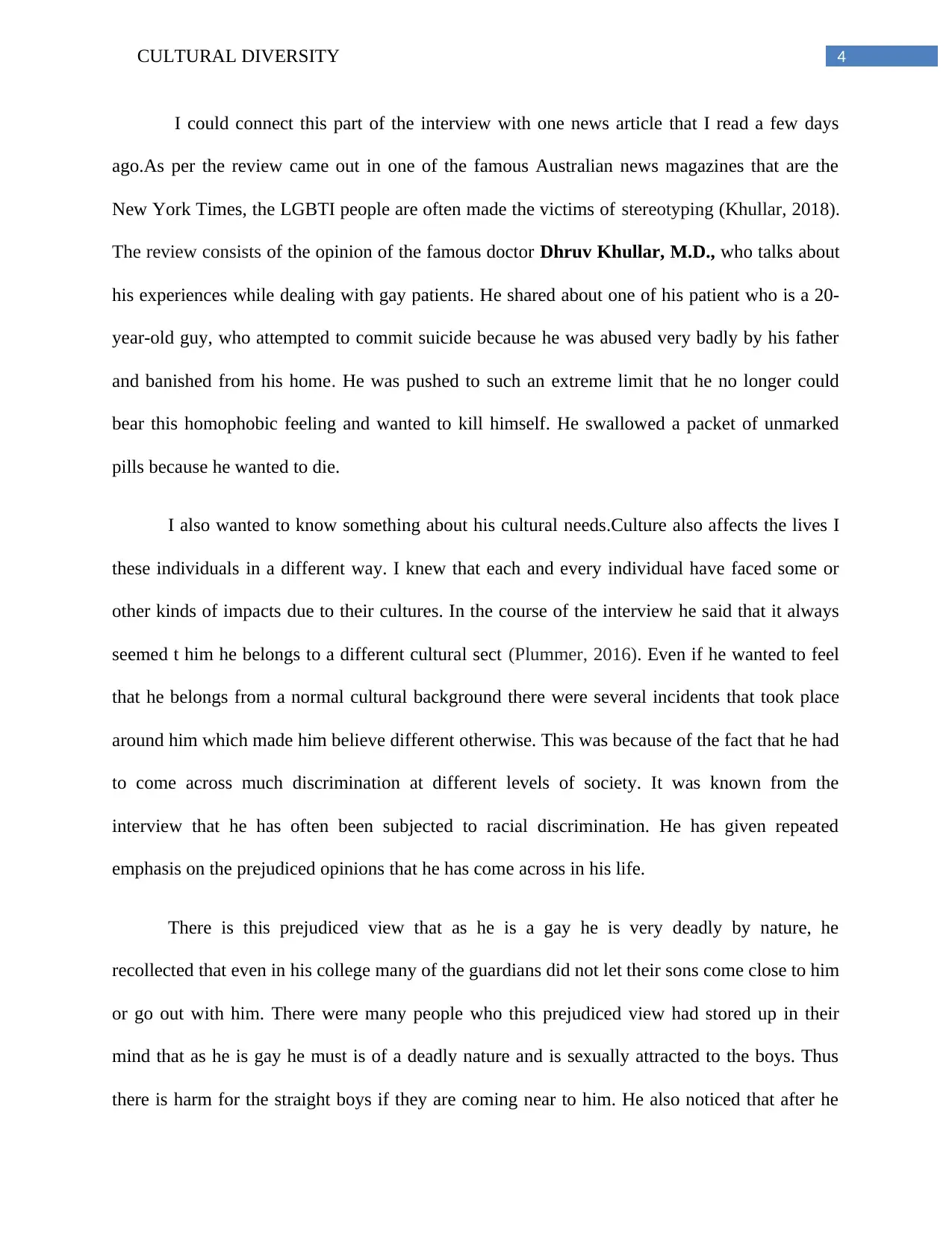
4CULTURAL DIVERSITY
I could connect this part of the interview with one news article that I read a few days
ago.As per the review came out in one of the famous Australian news magazines that are the
New York Times, the LGBTI people are often made the victims of stereotyping (Khullar, 2018).
The review consists of the opinion of the famous doctor Dhruv Khullar, M.D., who talks about
his experiences while dealing with gay patients. He shared about one of his patient who is a 20-
year-old guy, who attempted to commit suicide because he was abused very badly by his father
and banished from his home. He was pushed to such an extreme limit that he no longer could
bear this homophobic feeling and wanted to kill himself. He swallowed a packet of unmarked
pills because he wanted to die.
I also wanted to know something about his cultural needs.Culture also affects the lives I
these individuals in a different way. I knew that each and every individual have faced some or
other kinds of impacts due to their cultures. In the course of the interview he said that it always
seemed t him he belongs to a different cultural sect (Plummer, 2016). Even if he wanted to feel
that he belongs from a normal cultural background there were several incidents that took place
around him which made him believe different otherwise. This was because of the fact that he had
to come across much discrimination at different levels of society. It was known from the
interview that he has often been subjected to racial discrimination. He has given repeated
emphasis on the prejudiced opinions that he has come across in his life.
There is this prejudiced view that as he is a gay he is very deadly by nature, he
recollected that even in his college many of the guardians did not let their sons come close to him
or go out with him. There were many people who this prejudiced view had stored up in their
mind that as he is gay he must is of a deadly nature and is sexually attracted to the boys. Thus
there is harm for the straight boys if they are coming near to him. He also noticed that after he
I could connect this part of the interview with one news article that I read a few days
ago.As per the review came out in one of the famous Australian news magazines that are the
New York Times, the LGBTI people are often made the victims of stereotyping (Khullar, 2018).
The review consists of the opinion of the famous doctor Dhruv Khullar, M.D., who talks about
his experiences while dealing with gay patients. He shared about one of his patient who is a 20-
year-old guy, who attempted to commit suicide because he was abused very badly by his father
and banished from his home. He was pushed to such an extreme limit that he no longer could
bear this homophobic feeling and wanted to kill himself. He swallowed a packet of unmarked
pills because he wanted to die.
I also wanted to know something about his cultural needs.Culture also affects the lives I
these individuals in a different way. I knew that each and every individual have faced some or
other kinds of impacts due to their cultures. In the course of the interview he said that it always
seemed t him he belongs to a different cultural sect (Plummer, 2016). Even if he wanted to feel
that he belongs from a normal cultural background there were several incidents that took place
around him which made him believe different otherwise. This was because of the fact that he had
to come across much discrimination at different levels of society. It was known from the
interview that he has often been subjected to racial discrimination. He has given repeated
emphasis on the prejudiced opinions that he has come across in his life.
There is this prejudiced view that as he is a gay he is very deadly by nature, he
recollected that even in his college many of the guardians did not let their sons come close to him
or go out with him. There were many people who this prejudiced view had stored up in their
mind that as he is gay he must is of a deadly nature and is sexually attracted to the boys. Thus
there is harm for the straight boys if they are coming near to him. He also noticed that after he
Secure Best Marks with AI Grader
Need help grading? Try our AI Grader for instant feedback on your assignments.
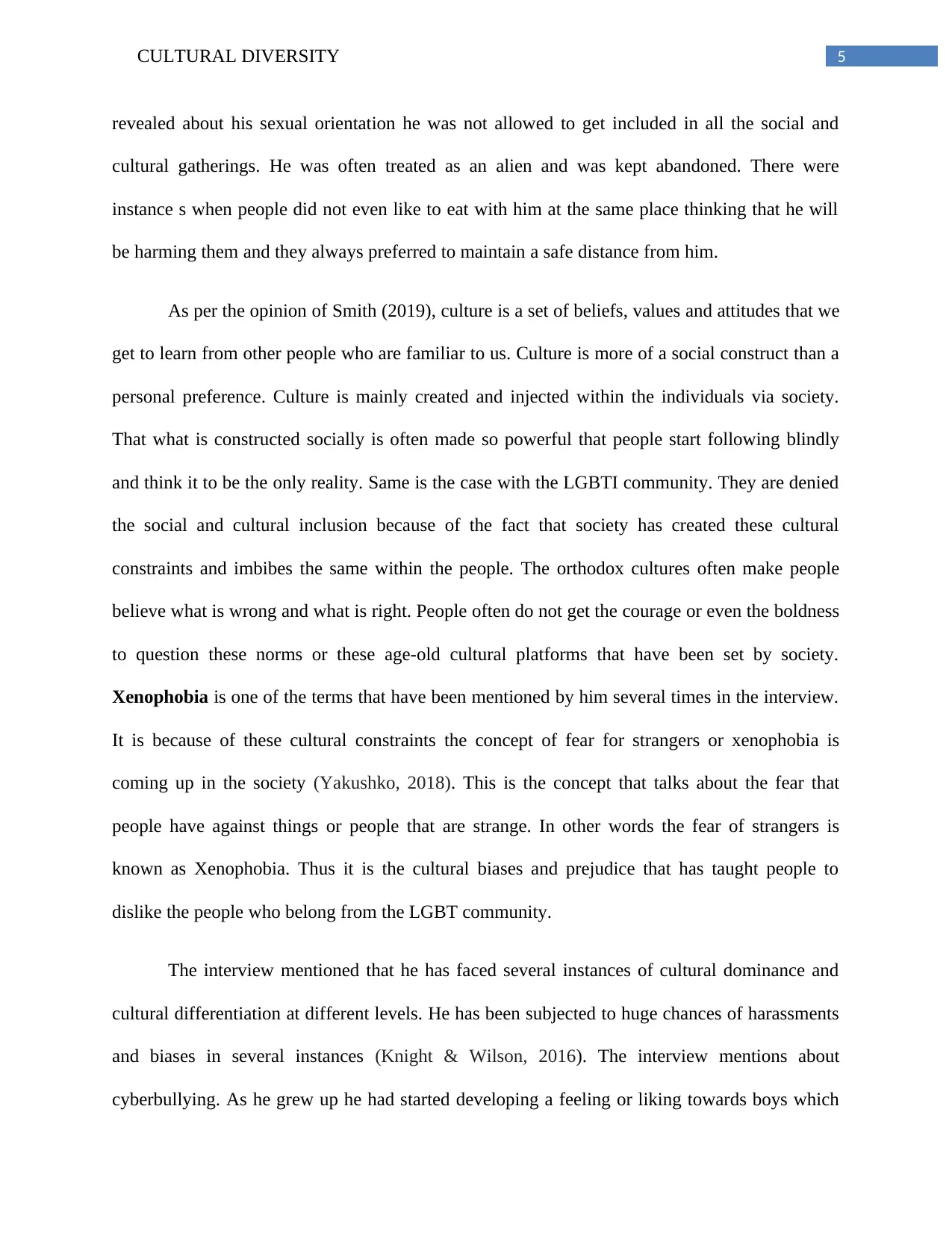
5CULTURAL DIVERSITY
revealed about his sexual orientation he was not allowed to get included in all the social and
cultural gatherings. He was often treated as an alien and was kept abandoned. There were
instance s when people did not even like to eat with him at the same place thinking that he will
be harming them and they always preferred to maintain a safe distance from him.
As per the opinion of Smith (2019), culture is a set of beliefs, values and attitudes that we
get to learn from other people who are familiar to us. Culture is more of a social construct than a
personal preference. Culture is mainly created and injected within the individuals via society.
That what is constructed socially is often made so powerful that people start following blindly
and think it to be the only reality. Same is the case with the LGBTI community. They are denied
the social and cultural inclusion because of the fact that society has created these cultural
constraints and imbibes the same within the people. The orthodox cultures often make people
believe what is wrong and what is right. People often do not get the courage or even the boldness
to question these norms or these age-old cultural platforms that have been set by society.
Xenophobia is one of the terms that have been mentioned by him several times in the interview.
It is because of these cultural constraints the concept of fear for strangers or xenophobia is
coming up in the society (Yakushko, 2018). This is the concept that talks about the fear that
people have against things or people that are strange. In other words the fear of strangers is
known as Xenophobia. Thus it is the cultural biases and prejudice that has taught people to
dislike the people who belong from the LGBT community.
The interview mentioned that he has faced several instances of cultural dominance and
cultural differentiation at different levels. He has been subjected to huge chances of harassments
and biases in several instances (Knight & Wilson, 2016). The interview mentions about
cyberbullying. As he grew up he had started developing a feeling or liking towards boys which
revealed about his sexual orientation he was not allowed to get included in all the social and
cultural gatherings. He was often treated as an alien and was kept abandoned. There were
instance s when people did not even like to eat with him at the same place thinking that he will
be harming them and they always preferred to maintain a safe distance from him.
As per the opinion of Smith (2019), culture is a set of beliefs, values and attitudes that we
get to learn from other people who are familiar to us. Culture is more of a social construct than a
personal preference. Culture is mainly created and injected within the individuals via society.
That what is constructed socially is often made so powerful that people start following blindly
and think it to be the only reality. Same is the case with the LGBTI community. They are denied
the social and cultural inclusion because of the fact that society has created these cultural
constraints and imbibes the same within the people. The orthodox cultures often make people
believe what is wrong and what is right. People often do not get the courage or even the boldness
to question these norms or these age-old cultural platforms that have been set by society.
Xenophobia is one of the terms that have been mentioned by him several times in the interview.
It is because of these cultural constraints the concept of fear for strangers or xenophobia is
coming up in the society (Yakushko, 2018). This is the concept that talks about the fear that
people have against things or people that are strange. In other words the fear of strangers is
known as Xenophobia. Thus it is the cultural biases and prejudice that has taught people to
dislike the people who belong from the LGBT community.
The interview mentioned that he has faced several instances of cultural dominance and
cultural differentiation at different levels. He has been subjected to huge chances of harassments
and biases in several instances (Knight & Wilson, 2016). The interview mentions about
cyberbullying. As he grew up he had started developing a feeling or liking towards boys which
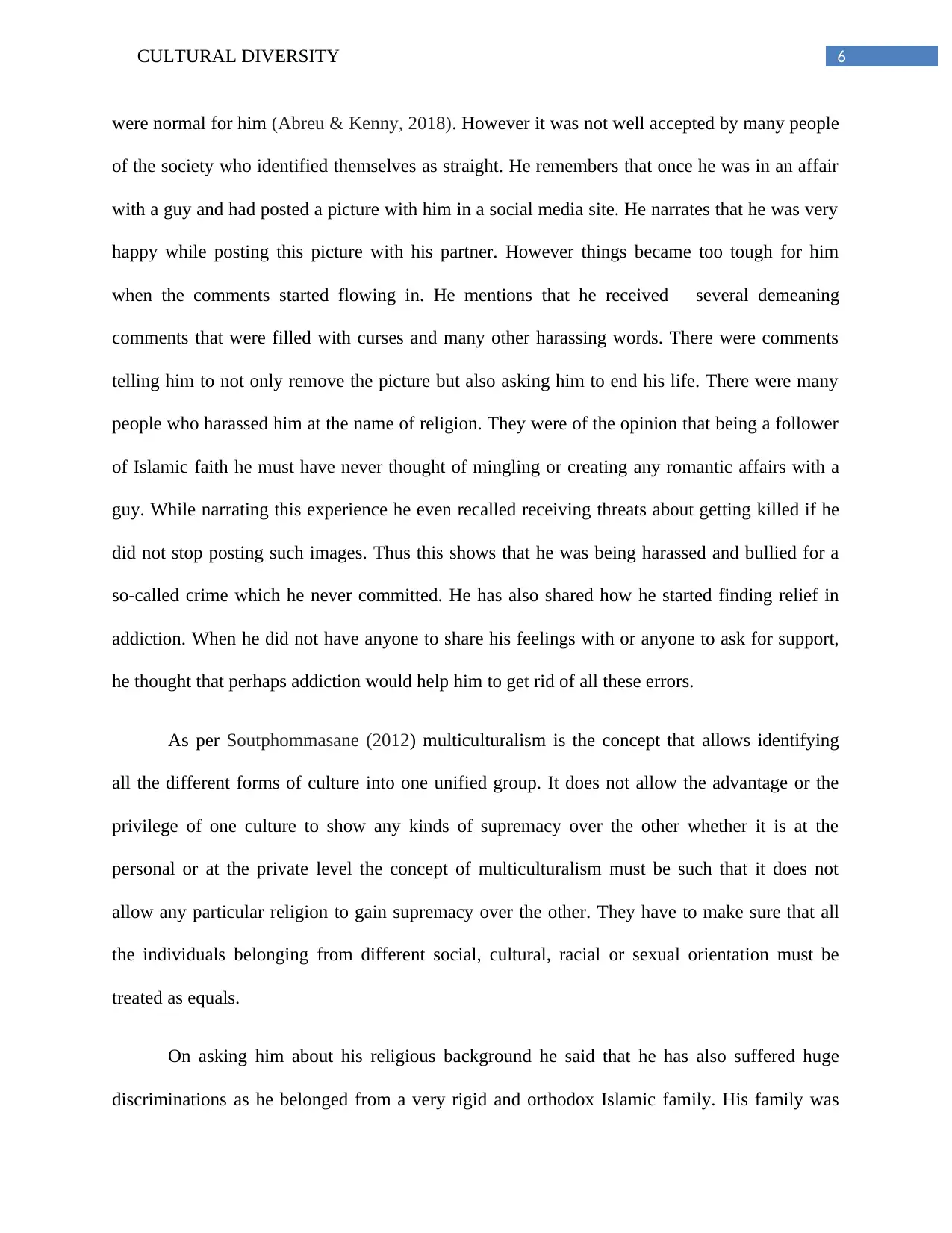
6CULTURAL DIVERSITY
were normal for him (Abreu & Kenny, 2018). However it was not well accepted by many people
of the society who identified themselves as straight. He remembers that once he was in an affair
with a guy and had posted a picture with him in a social media site. He narrates that he was very
happy while posting this picture with his partner. However things became too tough for him
when the comments started flowing in. He mentions that he received several demeaning
comments that were filled with curses and many other harassing words. There were comments
telling him to not only remove the picture but also asking him to end his life. There were many
people who harassed him at the name of religion. They were of the opinion that being a follower
of Islamic faith he must have never thought of mingling or creating any romantic affairs with a
guy. While narrating this experience he even recalled receiving threats about getting killed if he
did not stop posting such images. Thus this shows that he was being harassed and bullied for a
so-called crime which he never committed. He has also shared how he started finding relief in
addiction. When he did not have anyone to share his feelings with or anyone to ask for support,
he thought that perhaps addiction would help him to get rid of all these errors.
As per Soutphommasane (2012) multiculturalism is the concept that allows identifying
all the different forms of culture into one unified group. It does not allow the advantage or the
privilege of one culture to show any kinds of supremacy over the other whether it is at the
personal or at the private level the concept of multiculturalism must be such that it does not
allow any particular religion to gain supremacy over the other. They have to make sure that all
the individuals belonging from different social, cultural, racial or sexual orientation must be
treated as equals.
On asking him about his religious background he said that he has also suffered huge
discriminations as he belonged from a very rigid and orthodox Islamic family. His family was
were normal for him (Abreu & Kenny, 2018). However it was not well accepted by many people
of the society who identified themselves as straight. He remembers that once he was in an affair
with a guy and had posted a picture with him in a social media site. He narrates that he was very
happy while posting this picture with his partner. However things became too tough for him
when the comments started flowing in. He mentions that he received several demeaning
comments that were filled with curses and many other harassing words. There were comments
telling him to not only remove the picture but also asking him to end his life. There were many
people who harassed him at the name of religion. They were of the opinion that being a follower
of Islamic faith he must have never thought of mingling or creating any romantic affairs with a
guy. While narrating this experience he even recalled receiving threats about getting killed if he
did not stop posting such images. Thus this shows that he was being harassed and bullied for a
so-called crime which he never committed. He has also shared how he started finding relief in
addiction. When he did not have anyone to share his feelings with or anyone to ask for support,
he thought that perhaps addiction would help him to get rid of all these errors.
As per Soutphommasane (2012) multiculturalism is the concept that allows identifying
all the different forms of culture into one unified group. It does not allow the advantage or the
privilege of one culture to show any kinds of supremacy over the other whether it is at the
personal or at the private level the concept of multiculturalism must be such that it does not
allow any particular religion to gain supremacy over the other. They have to make sure that all
the individuals belonging from different social, cultural, racial or sexual orientation must be
treated as equals.
On asking him about his religious background he said that he has also suffered huge
discriminations as he belonged from a very rigid and orthodox Islamic family. His family was
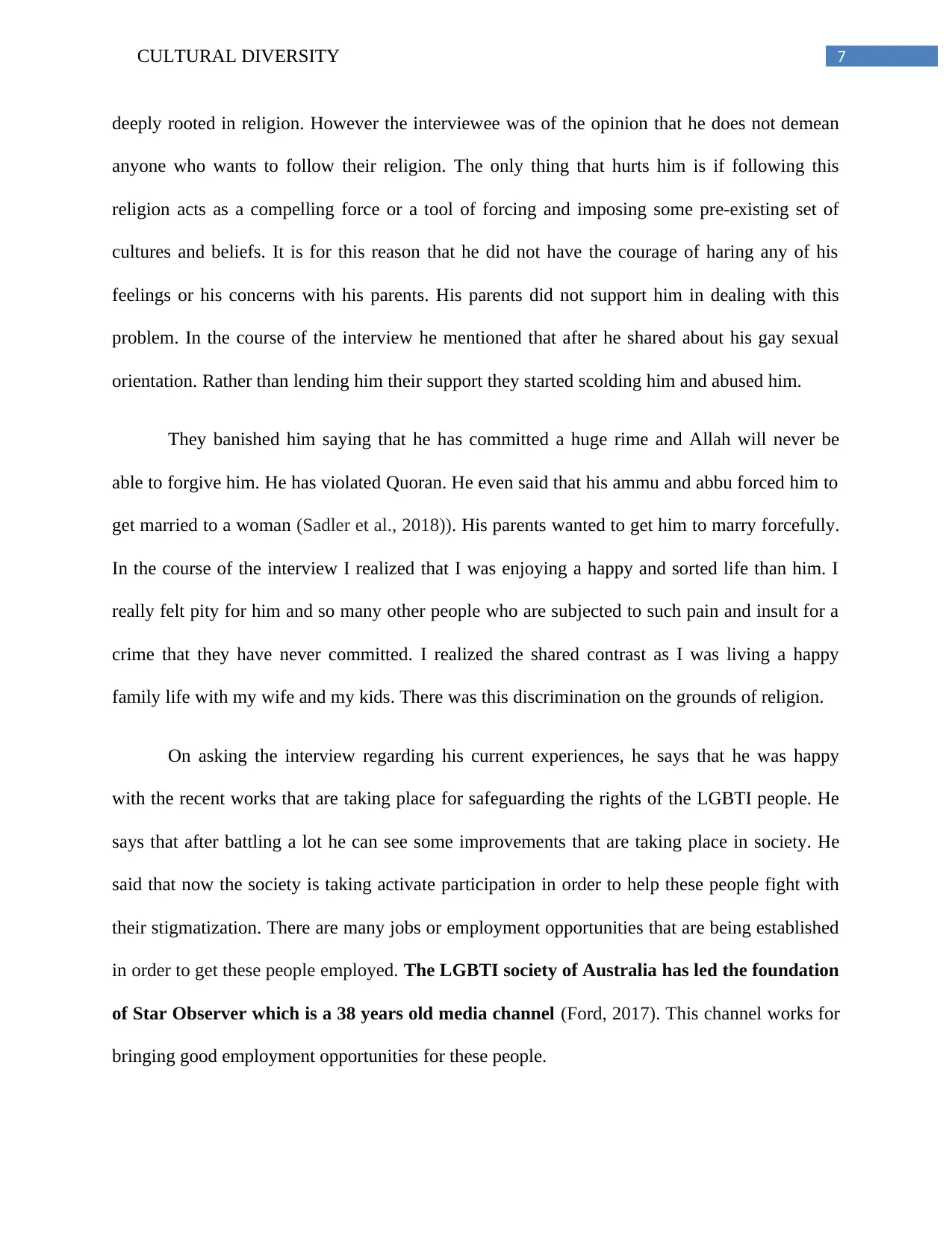
7CULTURAL DIVERSITY
deeply rooted in religion. However the interviewee was of the opinion that he does not demean
anyone who wants to follow their religion. The only thing that hurts him is if following this
religion acts as a compelling force or a tool of forcing and imposing some pre-existing set of
cultures and beliefs. It is for this reason that he did not have the courage of haring any of his
feelings or his concerns with his parents. His parents did not support him in dealing with this
problem. In the course of the interview he mentioned that after he shared about his gay sexual
orientation. Rather than lending him their support they started scolding him and abused him.
They banished him saying that he has committed a huge rime and Allah will never be
able to forgive him. He has violated Quoran. He even said that his ammu and abbu forced him to
get married to a woman (Sadler et al., 2018)). His parents wanted to get him to marry forcefully.
In the course of the interview I realized that I was enjoying a happy and sorted life than him. I
really felt pity for him and so many other people who are subjected to such pain and insult for a
crime that they have never committed. I realized the shared contrast as I was living a happy
family life with my wife and my kids. There was this discrimination on the grounds of religion.
On asking the interview regarding his current experiences, he says that he was happy
with the recent works that are taking place for safeguarding the rights of the LGBTI people. He
says that after battling a lot he can see some improvements that are taking place in society. He
said that now the society is taking activate participation in order to help these people fight with
their stigmatization. There are many jobs or employment opportunities that are being established
in order to get these people employed. The LGBTI society of Australia has led the foundation
of Star Observer which is a 38 years old media channel (Ford, 2017). This channel works for
bringing good employment opportunities for these people.
deeply rooted in religion. However the interviewee was of the opinion that he does not demean
anyone who wants to follow their religion. The only thing that hurts him is if following this
religion acts as a compelling force or a tool of forcing and imposing some pre-existing set of
cultures and beliefs. It is for this reason that he did not have the courage of haring any of his
feelings or his concerns with his parents. His parents did not support him in dealing with this
problem. In the course of the interview he mentioned that after he shared about his gay sexual
orientation. Rather than lending him their support they started scolding him and abused him.
They banished him saying that he has committed a huge rime and Allah will never be
able to forgive him. He has violated Quoran. He even said that his ammu and abbu forced him to
get married to a woman (Sadler et al., 2018)). His parents wanted to get him to marry forcefully.
In the course of the interview I realized that I was enjoying a happy and sorted life than him. I
really felt pity for him and so many other people who are subjected to such pain and insult for a
crime that they have never committed. I realized the shared contrast as I was living a happy
family life with my wife and my kids. There was this discrimination on the grounds of religion.
On asking the interview regarding his current experiences, he says that he was happy
with the recent works that are taking place for safeguarding the rights of the LGBTI people. He
says that after battling a lot he can see some improvements that are taking place in society. He
said that now the society is taking activate participation in order to help these people fight with
their stigmatization. There are many jobs or employment opportunities that are being established
in order to get these people employed. The LGBTI society of Australia has led the foundation
of Star Observer which is a 38 years old media channel (Ford, 2017). This channel works for
bringing good employment opportunities for these people.
Paraphrase This Document
Need a fresh take? Get an instant paraphrase of this document with our AI Paraphraser
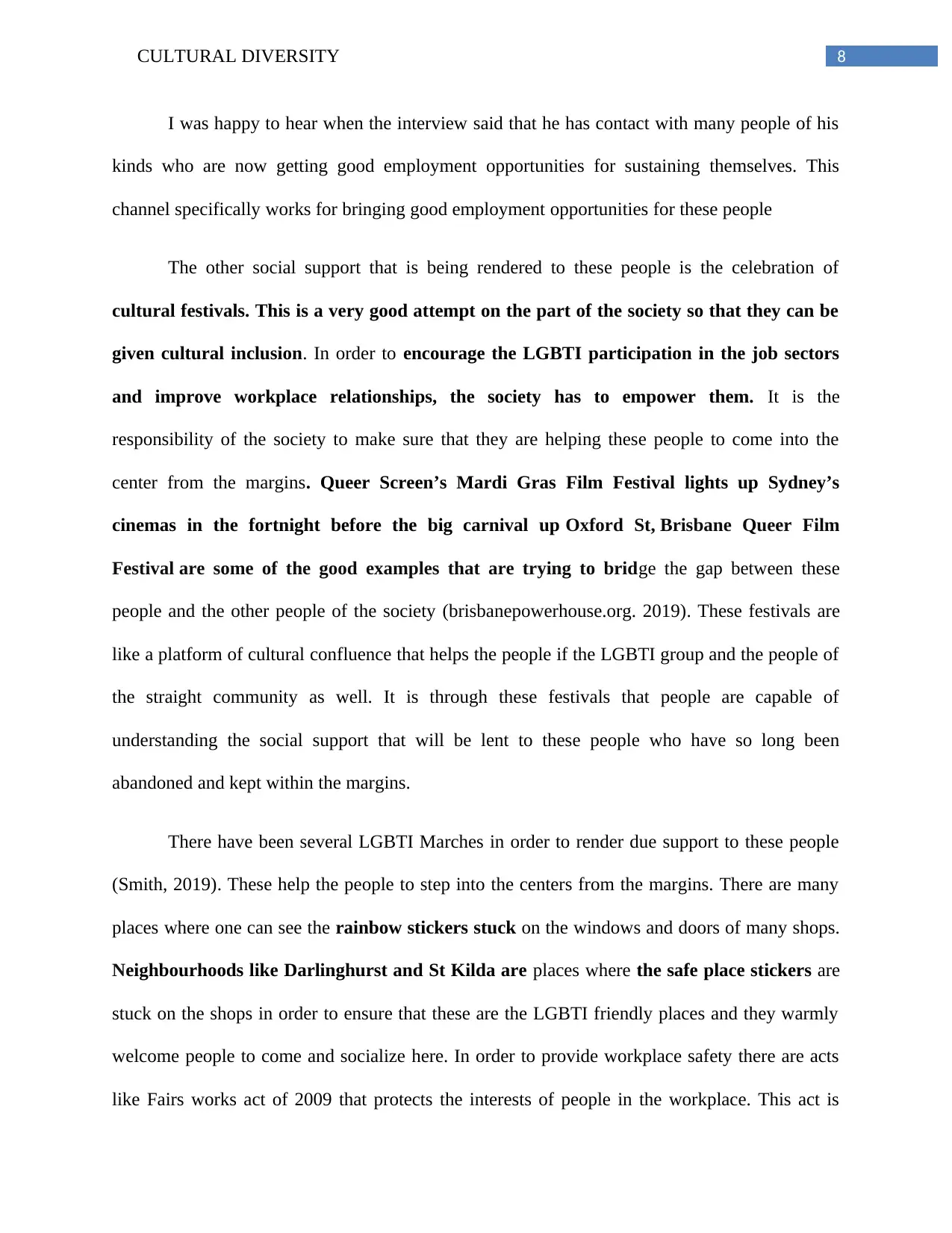
8CULTURAL DIVERSITY
I was happy to hear when the interview said that he has contact with many people of his
kinds who are now getting good employment opportunities for sustaining themselves. This
channel specifically works for bringing good employment opportunities for these people
The other social support that is being rendered to these people is the celebration of
cultural festivals. This is a very good attempt on the part of the society so that they can be
given cultural inclusion. In order to encourage the LGBTI participation in the job sectors
and improve workplace relationships, the society has to empower them. It is the
responsibility of the society to make sure that they are helping these people to come into the
center from the margins. Queer Screen’s Mardi Gras Film Festival lights up Sydney’s
cinemas in the fortnight before the big carnival up Oxford St, Brisbane Queer Film
Festival are some of the good examples that are trying to bridge the gap between these
people and the other people of the society (brisbanepowerhouse.org. 2019). These festivals are
like a platform of cultural confluence that helps the people if the LGBTI group and the people of
the straight community as well. It is through these festivals that people are capable of
understanding the social support that will be lent to these people who have so long been
abandoned and kept within the margins.
There have been several LGBTI Marches in order to render due support to these people
(Smith, 2019). These help the people to step into the centers from the margins. There are many
places where one can see the rainbow stickers stuck on the windows and doors of many shops.
Neighbourhoods like Darlinghurst and St Kilda are places where the safe place stickers are
stuck on the shops in order to ensure that these are the LGBTI friendly places and they warmly
welcome people to come and socialize here. In order to provide workplace safety there are acts
like Fairs works act of 2009 that protects the interests of people in the workplace. This act is
I was happy to hear when the interview said that he has contact with many people of his
kinds who are now getting good employment opportunities for sustaining themselves. This
channel specifically works for bringing good employment opportunities for these people
The other social support that is being rendered to these people is the celebration of
cultural festivals. This is a very good attempt on the part of the society so that they can be
given cultural inclusion. In order to encourage the LGBTI participation in the job sectors
and improve workplace relationships, the society has to empower them. It is the
responsibility of the society to make sure that they are helping these people to come into the
center from the margins. Queer Screen’s Mardi Gras Film Festival lights up Sydney’s
cinemas in the fortnight before the big carnival up Oxford St, Brisbane Queer Film
Festival are some of the good examples that are trying to bridge the gap between these
people and the other people of the society (brisbanepowerhouse.org. 2019). These festivals are
like a platform of cultural confluence that helps the people if the LGBTI group and the people of
the straight community as well. It is through these festivals that people are capable of
understanding the social support that will be lent to these people who have so long been
abandoned and kept within the margins.
There have been several LGBTI Marches in order to render due support to these people
(Smith, 2019). These help the people to step into the centers from the margins. There are many
places where one can see the rainbow stickers stuck on the windows and doors of many shops.
Neighbourhoods like Darlinghurst and St Kilda are places where the safe place stickers are
stuck on the shops in order to ensure that these are the LGBTI friendly places and they warmly
welcome people to come and socialize here. In order to provide workplace safety there are acts
like Fairs works act of 2009 that protects the interests of people in the workplace. This act is
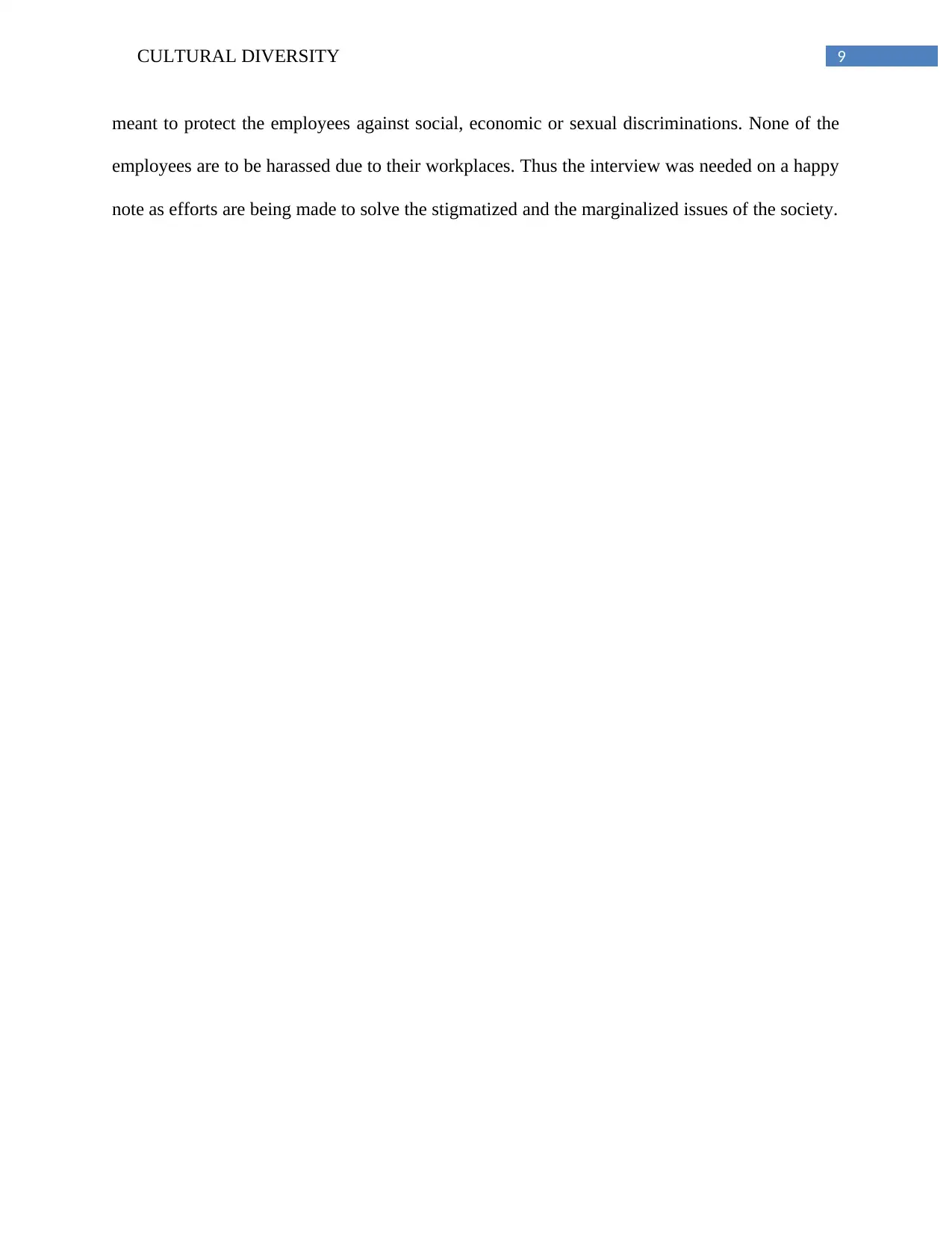
9CULTURAL DIVERSITY
meant to protect the employees against social, economic or sexual discriminations. None of the
employees are to be harassed due to their workplaces. Thus the interview was needed on a happy
note as efforts are being made to solve the stigmatized and the marginalized issues of the society.
meant to protect the employees against social, economic or sexual discriminations. None of the
employees are to be harassed due to their workplaces. Thus the interview was needed on a happy
note as efforts are being made to solve the stigmatized and the marginalized issues of the society.
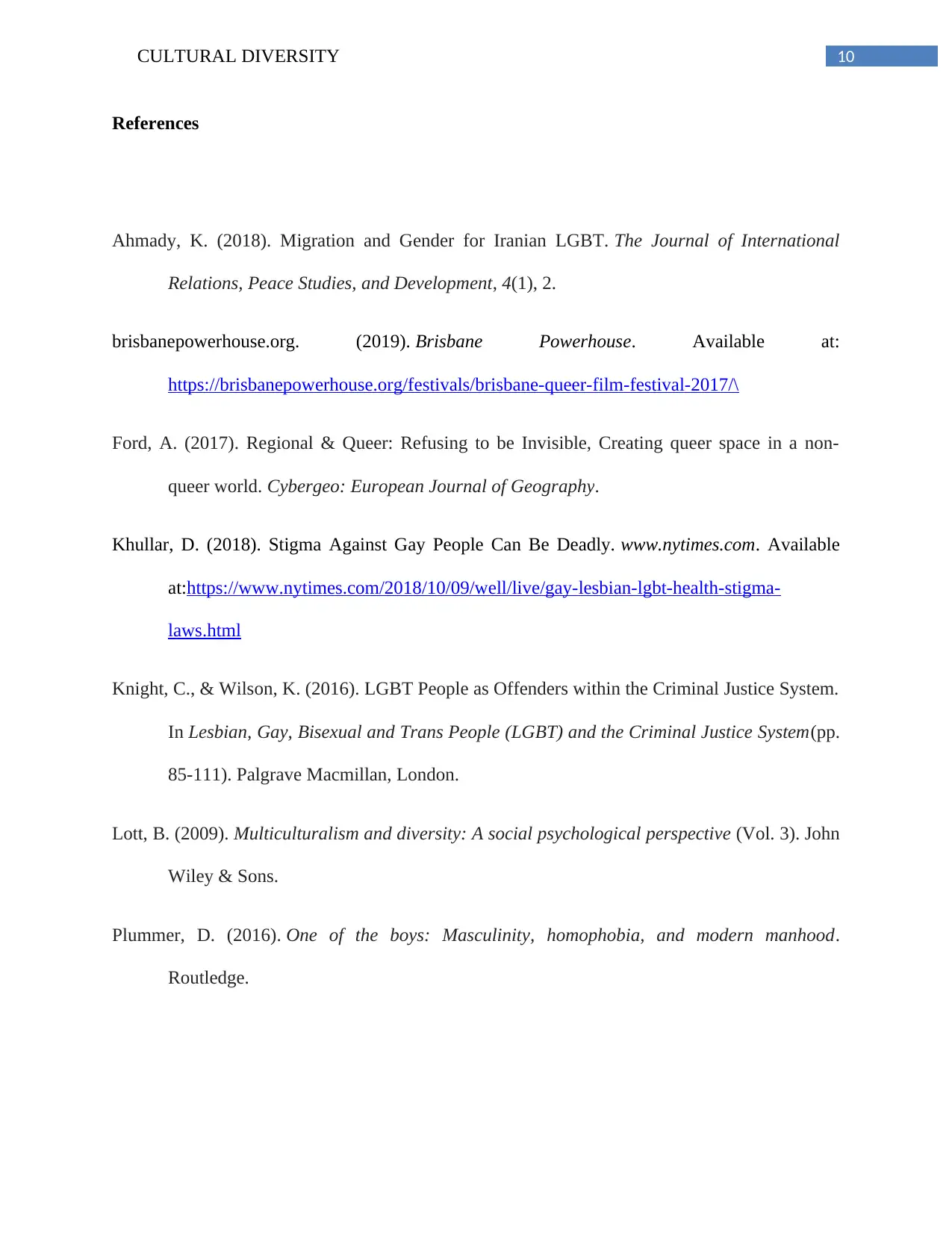
10CULTURAL DIVERSITY
References
Ahmady, K. (2018). Migration and Gender for Iranian LGBT. The Journal of International
Relations, Peace Studies, and Development, 4(1), 2.
brisbanepowerhouse.org. (2019). Brisbane Powerhouse. Available at:
https://brisbanepowerhouse.org/festivals/brisbane-queer-film-festival-2017/\
Ford, A. (2017). Regional & Queer: Refusing to be Invisible, Creating queer space in a non-
queer world. Cybergeo: European Journal of Geography.
Khullar, D. (2018). Stigma Against Gay People Can Be Deadly. www.nytimes.com. Available
at:https://www.nytimes.com/2018/10/09/well/live/gay-lesbian-lgbt-health-stigma-
laws.html
Knight, C., & Wilson, K. (2016). LGBT People as Offenders within the Criminal Justice System.
In Lesbian, Gay, Bisexual and Trans People (LGBT) and the Criminal Justice System(pp.
85-111). Palgrave Macmillan, London.
Lott, B. (2009). Multiculturalism and diversity: A social psychological perspective (Vol. 3). John
Wiley & Sons.
Plummer, D. (2016). One of the boys: Masculinity, homophobia, and modern manhood.
Routledge.
References
Ahmady, K. (2018). Migration and Gender for Iranian LGBT. The Journal of International
Relations, Peace Studies, and Development, 4(1), 2.
brisbanepowerhouse.org. (2019). Brisbane Powerhouse. Available at:
https://brisbanepowerhouse.org/festivals/brisbane-queer-film-festival-2017/\
Ford, A. (2017). Regional & Queer: Refusing to be Invisible, Creating queer space in a non-
queer world. Cybergeo: European Journal of Geography.
Khullar, D. (2018). Stigma Against Gay People Can Be Deadly. www.nytimes.com. Available
at:https://www.nytimes.com/2018/10/09/well/live/gay-lesbian-lgbt-health-stigma-
laws.html
Knight, C., & Wilson, K. (2016). LGBT People as Offenders within the Criminal Justice System.
In Lesbian, Gay, Bisexual and Trans People (LGBT) and the Criminal Justice System(pp.
85-111). Palgrave Macmillan, London.
Lott, B. (2009). Multiculturalism and diversity: A social psychological perspective (Vol. 3). John
Wiley & Sons.
Plummer, D. (2016). One of the boys: Masculinity, homophobia, and modern manhood.
Routledge.
Secure Best Marks with AI Grader
Need help grading? Try our AI Grader for instant feedback on your assignments.
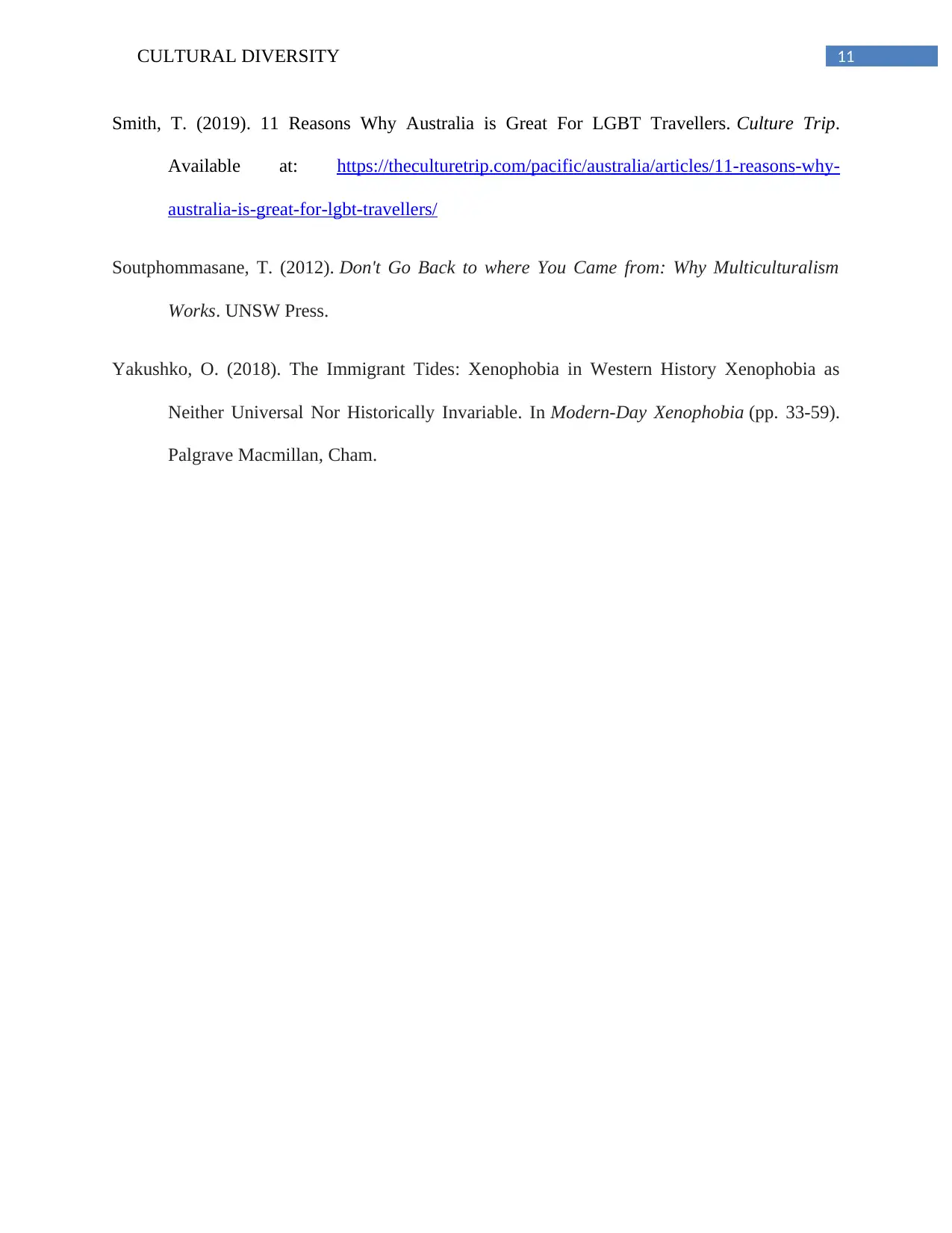
11CULTURAL DIVERSITY
Smith, T. (2019). 11 Reasons Why Australia is Great For LGBT Travellers. Culture Trip.
Available at: https://theculturetrip.com/pacific/australia/articles/11-reasons-why-
australia-is-great-for-lgbt-travellers/
Soutphommasane, T. (2012). Don't Go Back to where You Came from: Why Multiculturalism
Works. UNSW Press.
Yakushko, O. (2018). The Immigrant Tides: Xenophobia in Western History Xenophobia as
Neither Universal Nor Historically Invariable. In Modern-Day Xenophobia (pp. 33-59).
Palgrave Macmillan, Cham.
Smith, T. (2019). 11 Reasons Why Australia is Great For LGBT Travellers. Culture Trip.
Available at: https://theculturetrip.com/pacific/australia/articles/11-reasons-why-
australia-is-great-for-lgbt-travellers/
Soutphommasane, T. (2012). Don't Go Back to where You Came from: Why Multiculturalism
Works. UNSW Press.
Yakushko, O. (2018). The Immigrant Tides: Xenophobia in Western History Xenophobia as
Neither Universal Nor Historically Invariable. In Modern-Day Xenophobia (pp. 33-59).
Palgrave Macmillan, Cham.
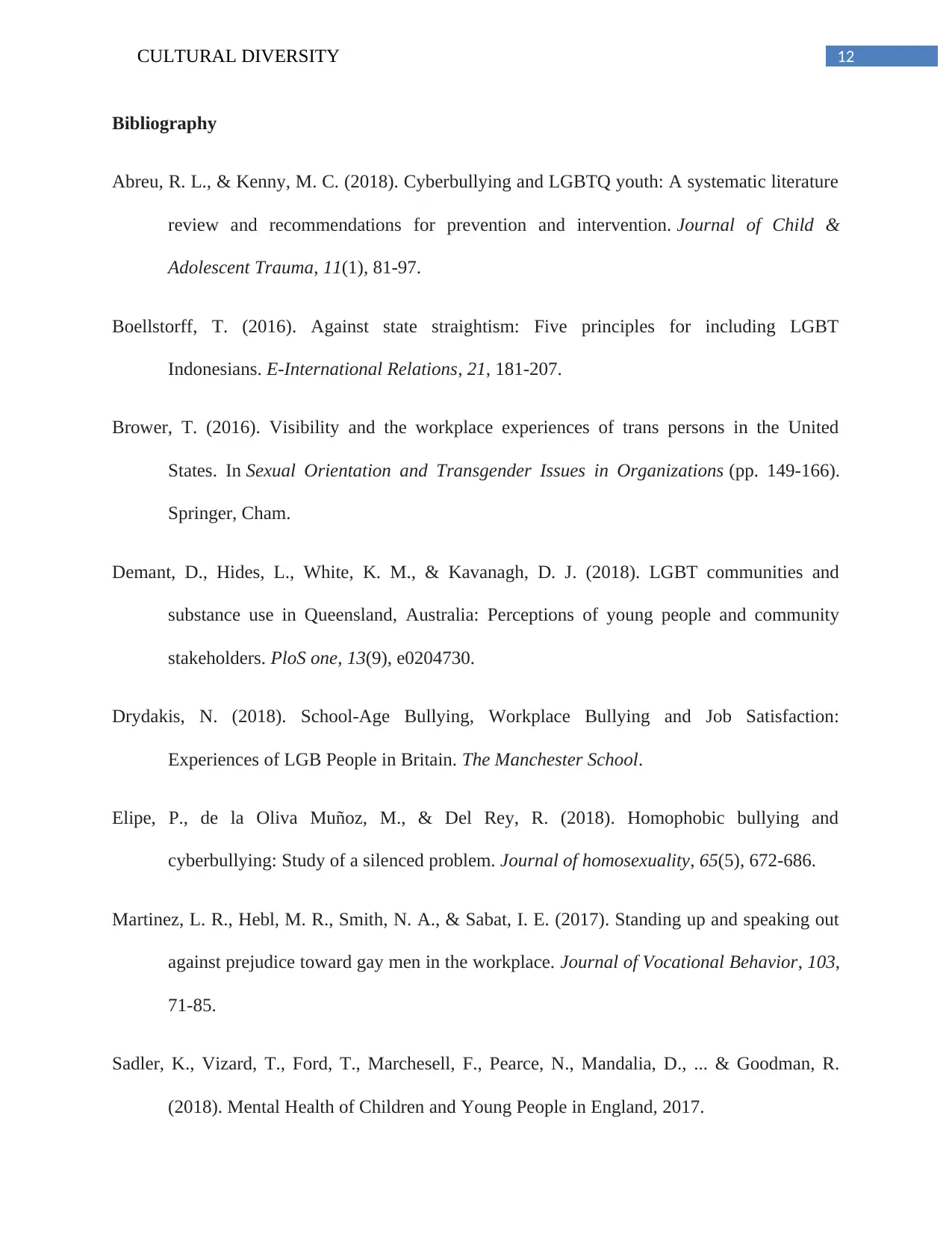
12CULTURAL DIVERSITY
Bibliography
Abreu, R. L., & Kenny, M. C. (2018). Cyberbullying and LGBTQ youth: A systematic literature
review and recommendations for prevention and intervention. Journal of Child &
Adolescent Trauma, 11(1), 81-97.
Boellstorff, T. (2016). Against state straightism: Five principles for including LGBT
Indonesians. E-International Relations, 21, 181-207.
Brower, T. (2016). Visibility and the workplace experiences of trans persons in the United
States. In Sexual Orientation and Transgender Issues in Organizations (pp. 149-166).
Springer, Cham.
Demant, D., Hides, L., White, K. M., & Kavanagh, D. J. (2018). LGBT communities and
substance use in Queensland, Australia: Perceptions of young people and community
stakeholders. PloS one, 13(9), e0204730.
Drydakis, N. (2018). School‐Age Bullying, Workplace Bullying and Job Satisfaction:
Experiences of LGB People in Britain. The Manchester School.
Elipe, P., de la Oliva Muñoz, M., & Del Rey, R. (2018). Homophobic bullying and
cyberbullying: Study of a silenced problem. Journal of homosexuality, 65(5), 672-686.
Martinez, L. R., Hebl, M. R., Smith, N. A., & Sabat, I. E. (2017). Standing up and speaking out
against prejudice toward gay men in the workplace. Journal of Vocational Behavior, 103,
71-85.
Sadler, K., Vizard, T., Ford, T., Marchesell, F., Pearce, N., Mandalia, D., ... & Goodman, R.
(2018). Mental Health of Children and Young People in England, 2017.
Bibliography
Abreu, R. L., & Kenny, M. C. (2018). Cyberbullying and LGBTQ youth: A systematic literature
review and recommendations for prevention and intervention. Journal of Child &
Adolescent Trauma, 11(1), 81-97.
Boellstorff, T. (2016). Against state straightism: Five principles for including LGBT
Indonesians. E-International Relations, 21, 181-207.
Brower, T. (2016). Visibility and the workplace experiences of trans persons in the United
States. In Sexual Orientation and Transgender Issues in Organizations (pp. 149-166).
Springer, Cham.
Demant, D., Hides, L., White, K. M., & Kavanagh, D. J. (2018). LGBT communities and
substance use in Queensland, Australia: Perceptions of young people and community
stakeholders. PloS one, 13(9), e0204730.
Drydakis, N. (2018). School‐Age Bullying, Workplace Bullying and Job Satisfaction:
Experiences of LGB People in Britain. The Manchester School.
Elipe, P., de la Oliva Muñoz, M., & Del Rey, R. (2018). Homophobic bullying and
cyberbullying: Study of a silenced problem. Journal of homosexuality, 65(5), 672-686.
Martinez, L. R., Hebl, M. R., Smith, N. A., & Sabat, I. E. (2017). Standing up and speaking out
against prejudice toward gay men in the workplace. Journal of Vocational Behavior, 103,
71-85.
Sadler, K., Vizard, T., Ford, T., Marchesell, F., Pearce, N., Mandalia, D., ... & Goodman, R.
(2018). Mental Health of Children and Young People in England, 2017.
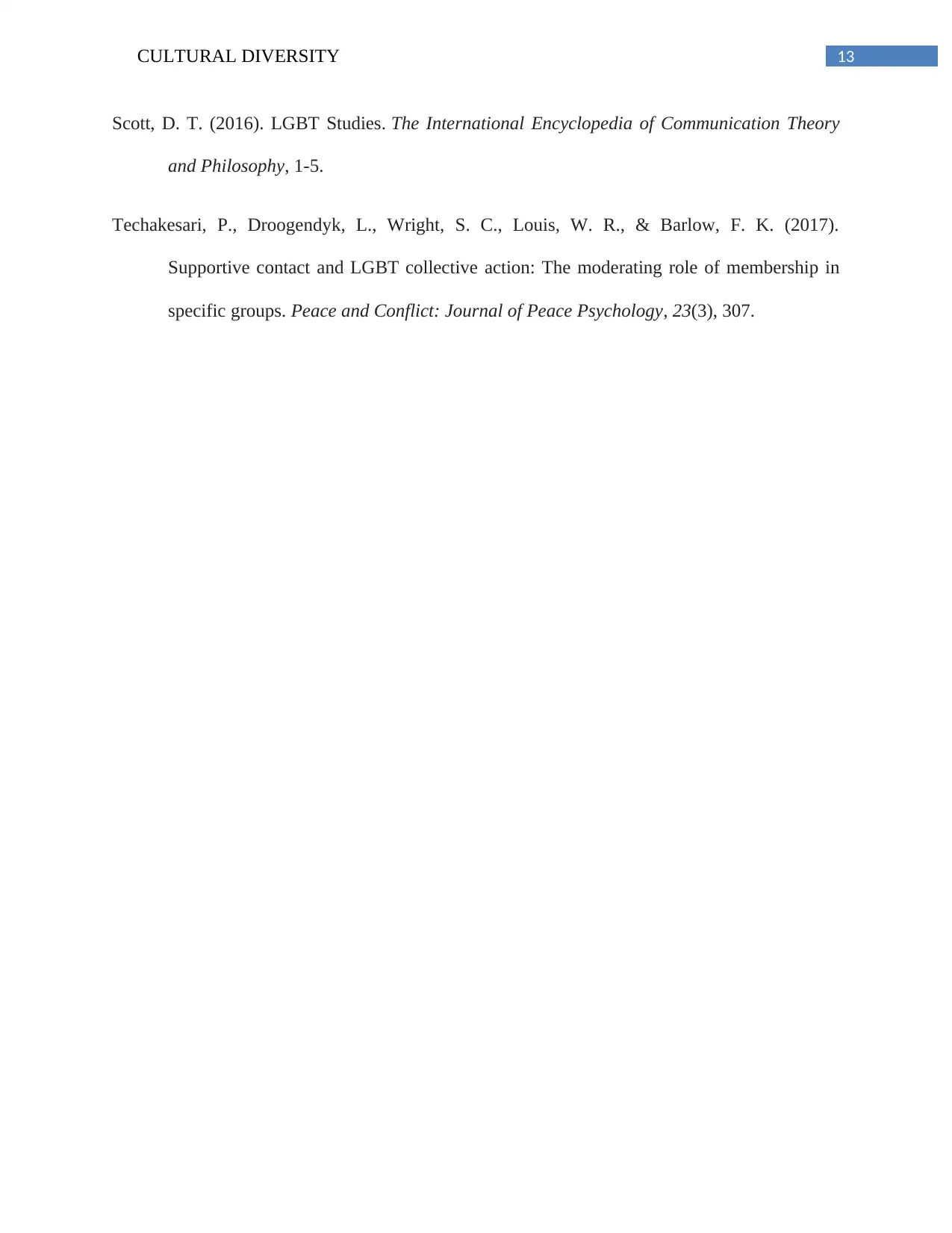
13CULTURAL DIVERSITY
Scott, D. T. (2016). LGBT Studies. The International Encyclopedia of Communication Theory
and Philosophy, 1-5.
Techakesari, P., Droogendyk, L., Wright, S. C., Louis, W. R., & Barlow, F. K. (2017).
Supportive contact and LGBT collective action: The moderating role of membership in
specific groups. Peace and Conflict: Journal of Peace Psychology, 23(3), 307.
Scott, D. T. (2016). LGBT Studies. The International Encyclopedia of Communication Theory
and Philosophy, 1-5.
Techakesari, P., Droogendyk, L., Wright, S. C., Louis, W. R., & Barlow, F. K. (2017).
Supportive contact and LGBT collective action: The moderating role of membership in
specific groups. Peace and Conflict: Journal of Peace Psychology, 23(3), 307.
Paraphrase This Document
Need a fresh take? Get an instant paraphrase of this document with our AI Paraphraser
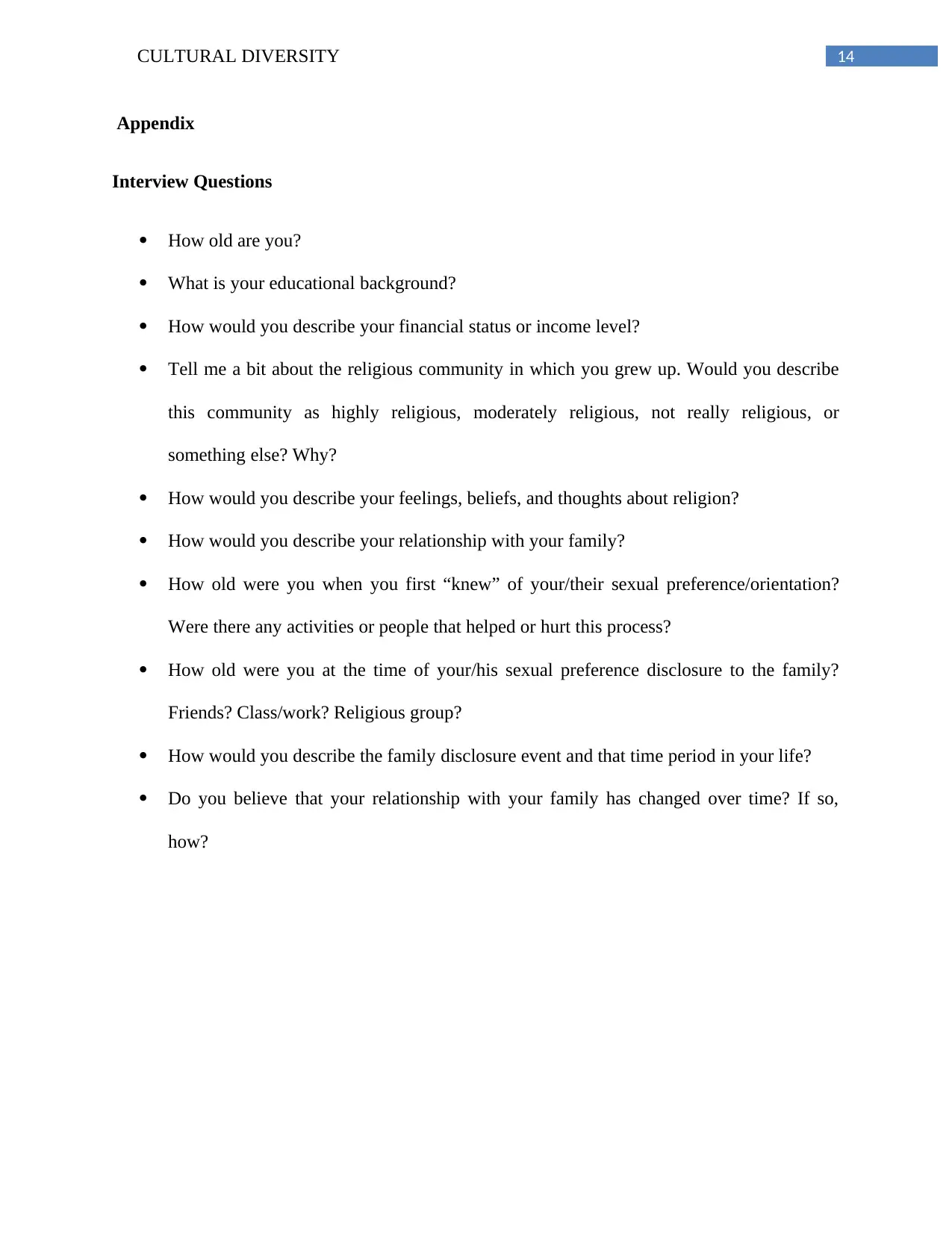
14CULTURAL DIVERSITY
Appendix
Interview Questions
How old are you?
What is your educational background?
How would you describe your financial status or income level?
Tell me a bit about the religious community in which you grew up. Would you describe
this community as highly religious, moderately religious, not really religious, or
something else? Why?
How would you describe your feelings, beliefs, and thoughts about religion?
How would you describe your relationship with your family?
How old were you when you first “knew” of your/their sexual preference/orientation?
Were there any activities or people that helped or hurt this process?
How old were you at the time of your/his sexual preference disclosure to the family?
Friends? Class/work? Religious group?
How would you describe the family disclosure event and that time period in your life?
Do you believe that your relationship with your family has changed over time? If so,
how?
Appendix
Interview Questions
How old are you?
What is your educational background?
How would you describe your financial status or income level?
Tell me a bit about the religious community in which you grew up. Would you describe
this community as highly religious, moderately religious, not really religious, or
something else? Why?
How would you describe your feelings, beliefs, and thoughts about religion?
How would you describe your relationship with your family?
How old were you when you first “knew” of your/their sexual preference/orientation?
Were there any activities or people that helped or hurt this process?
How old were you at the time of your/his sexual preference disclosure to the family?
Friends? Class/work? Religious group?
How would you describe the family disclosure event and that time period in your life?
Do you believe that your relationship with your family has changed over time? If so,
how?
1 out of 14
Related Documents
Your All-in-One AI-Powered Toolkit for Academic Success.
+13062052269
info@desklib.com
Available 24*7 on WhatsApp / Email
![[object Object]](/_next/static/media/star-bottom.7253800d.svg)
Unlock your academic potential
© 2024 | Zucol Services PVT LTD | All rights reserved.





